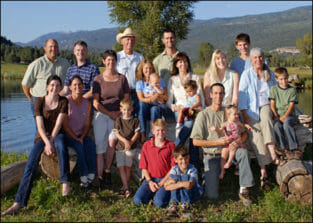James Family: Effective Family Farm Meetings
For the James Family of Durango, Colorado, guess what is a significant contributor to family harmony?
Meetings.
This is not a joke! The family views their structured meeting process as a key to their ability to bring up to 22 family members (including in-laws and grandchildren) together to make farm decisions based on consensus.
There are a lot of challenges with family meetings (and meetings in general), including:
- One person dominating the conversation and decision making;
- Getting off track of the agenda (if there is even planning and an agenda in the first place);
- Reaching the end of a long meeting with no decisions.
To tackle these meeting problems and others, the family uses a “delegated meeting process” that Joe Wheeling (married to Jennifer James Wheeling) used during an earlier corporate career and the family has adapted for their own use.
“We meet three-to-four times a year to talk about the big structural issues, like do we buy or sell land. These are two-to-three hour meetings unless it is really something significant. The whole idea of this structure is that major decisions are made right there at the meeting. There are no water cooler side conversations that result in decisions. We get in, we develop consensus and then we get out.”
Such a disciplined process involves assigning family members different roles, which rotate with each meeting so that everyone develops skills. “Somebody is going to be a great moderator in your group; others are not, but everyone has to learn,” Joe says.
Those meeting roles include:
Moderator: Asks for agenda items beforehand. Ensures that all the information needed to make that decision is gathered. Prepares and disseminates the agenda (including assigning time limits for each item), encourages participation, brings focus to the meeting.
Pacer: Manages the time, gives “warnings” when time is almost up for the agenda item.
Scribe: Records decisions, such as: what are we doing, who is doing it, how are we doing it. Clarifies and confirms all decisions and actions. Distributes the decisions soon after the meeting.
Decision Driver: works toward consensus and asks: Did I hear correctly? Works with moderator to stimulate new perspectives; makes sure quiet people’s perspectives are heard,
Coach: Gives feedback, typically at end of meeting but can during meeting if things are going off track, stops the side conversations.
Goal Keeper: The James Family have developed an overall farm goal (a holistic goal); this person tests decisions against that goal. The decision might still pass.
Host: Plans food, organizes child care if needed, and other logistics.
Smaller families might need to combine roles. Decision driver and scribe can be the same person, as can the coach and pacer, Joe says.
Before the meeting, family members send agenda items to the moderator, including the topic, time requested, decision required and any advance materials. The moderator then develops an agenda and sends it out a few days in advance. All family members are required to review the agenda and relevant materials before the meeting.
Each meeting starts with some inspirational reading from the Bible, the Buddha, Wendell Berry or other source. This allows family members to finish last conversations, pause and calm down. The moderator then reviews roles, the agenda, meeting objectives and decisions made at the previous meeting. During the meeting, the decision driver and moderator work together, and the goal keeper filters the decisions through the family’s holistic goal. The scribe keeps notes of decisions. The pacer limits tangent conversations and keeps the family to their agenda.
At the end of the meeting, the scribe reviews decisions. The coach speaks on opportunities to improve.
After the meeting, the scribe distributes all meeting minutes to family in timely manner. Family members review minutes. Then the decisions are implemented.
“We have seen some meeting challenges with our family,” Joe admits. “Ensuring that the coach pushes to improve is one. It’s an uncomfortable role. The person proposing the agenda item needs to be realistic about the time needed to make a decision. Doing the advanced prep and sharing up front is another challenge. Limiting tangents is another problem.” Joe recommends a ”parking lot” for topics that come up that are not on the agenda. “If it is a good idea we will get to it,” he says.
Other questions about the James process?
Q: There are three generations at family meetings, but are all of them equal decision makers?
A: “For certain topics, we try to include every family member. And for some topics, it is just the adults. But now we have young adults, so that is going to change.”
Q: Does each independent business (such as the grass-fed beef enterprise, the tree nursery) have its own separate business meeting?
A: “There are separate meetings for the different enterprises. The meeting process is adapted to each type of meeting. But regardless of the meeting, the key is to remember that the goals are efficiency, people development and sharing roles.”
Q: How does the family manage conflict?
A: “If we have a conflict in a family meeting session, it is emotional but it tends to get resolved. It can be delicate to bring the conflict to the whole family in the meeting, but it can sort itself out better that way,” rather than have it fester in side conversations.
“Our meetings are not a good format for information exchange—there are a lot of other vehicles for doing that, like dinner conversations, emails and texts,” Joe says. “They are designed for each family member to participate, even without an assigned role. Everyone is responsible for meeting outcomes. No one can say afterwards that they didn’t agree to the decisions made at the meeting.”
For more on the James Family’s approach to effective family meetings, see their 2014 PFI conference presentation on how to hold effective family farm meetings: https://www.youtube.com/watch?v=eaLmJINH8bA
For more on James Ranch, see: http://jamesranch.net/

